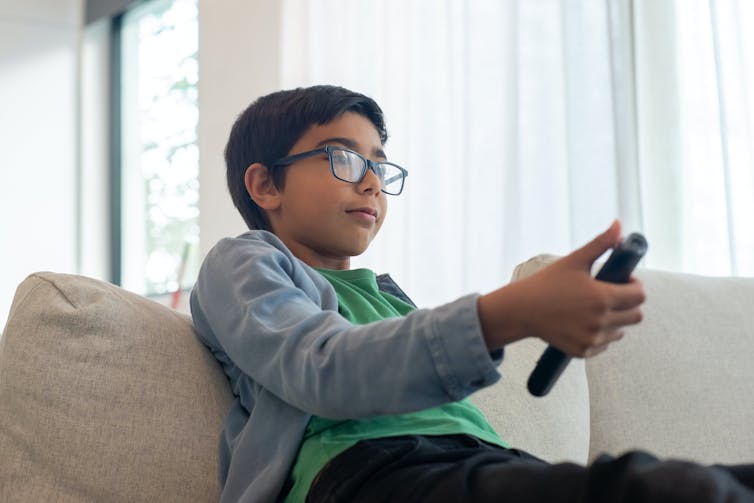Are you sure you want Frozen again? You’ve already seen it 20 times!
Do you find your children asking to watch the same TV shows and movies, or play the same video games over and over (and over again)? Perhaps you also find yourself thinking it would be better if they had a more varied screen-time diet.
The good news is, it’s perfectly OK for children to watch and repeat. In fact, it can help them learn.
Read more: 'Screen time' for kids is an outdated concept, so let's ditch it and focus on quality instead
Children learn through repetition
Children have a lot to learn about themselves and the world. A big part of the way they do this is through repetition.
This applies to learning to walk, talk and read. But it can also be said for TV shows, movies and video games with a storyline such as Stardew Valley.
Children may start by learning about the plot. On subsequent viewings they may pick up more details about the characters, the songs, the context or even the subtle twists and turns of the plot.
So this offers children insights into different characters, stories and ideas. These different perspectives offer valuable opportunities for learning about people and the world.
Repeat watching also enables immersion into a make-believe world that provides comfort. Just like adults might enjoy catching up on old episodes of Seinfeld or Friends, or watching Love, Actually each Christmas.

A unique opportunity
When a child watches something over and over, this also opens up unique learning opportunities because they get to know the story so well.
Once a child is very familiar with a storyline, they can have deep discussion to help them think critically about what they are watching, especially once they’ve reached primary-school age.
Together, you can share ideas and consider alternative viewpoints to those offered in the story. Together, you can also question the assumptions in the characters’ actions and the storyline.
This will help your child’s critical thinking and help them evaluate information in the rest of their lives. It can also help them weigh up positive and negative attributes of characters, plots and beliefs that form part of the storyline.
Ultimately, this can help your child learn to reason and make judgements about controversial issues, and hopefully learn to do this in a respectful way.
How can you talk to your kids about their favourite shows?
If you want to have a thorough discussion with your child about their favourite program or game, set aside some time when you are not rushed.
Prepare by watching the program or movie, or playing the game before the discussion. Show excitement at the prospect of this time with your child and be prepared to listen carefully.
It is important for the discussions to be a two-way exchange where you both listen to each other (and not just a parent telling the child what the story is about or alternatively nodding along while the child gives their version).
The trick is to ask questions that do not have one right answer. Many stories bring up issues of ethics, morals, conflict, relationships, social issues and offer insights into the life of others. You could ask your child:
what they think the message in the story might be? Then ask them to justify their response with evidence from the story
about alternative perspectives. For example, maybe the movie was about the way someone’s actions affect others (rather than the power of magic or the triumph of goodies over baddies or the importance of family. Or maybe it was all of these things.)
You could also ask:
- why they think character A did B? Then ask them if they agree with the actions or would have done something different themselves. Then ask them to justify their answer.
The aim is to discuss alternative messages and justify the response with examples from the story.
In this way you are helping your child make meaning in their world – a vital skill as they grow up.
So, next time the same show or movie goes on again, relax. It may be annoying for you to hear the same songs or storyline for the 1,000th time, but there are benefits for your child.
.

